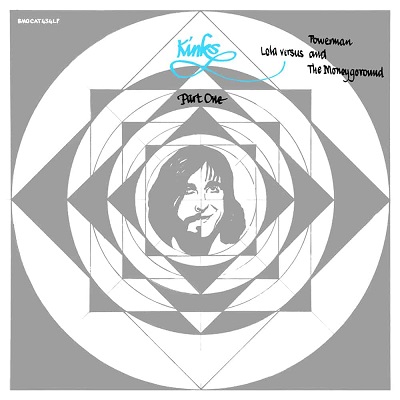For the third 50th anniversary of an album by the Kinks, BMG’s special multi-format reissue of Lola Versus Powerman And The Moneygoround, Part One, originally released in late 1970, spares no expense in bringing the specs up on the original record, and throwing in the obligatory extras of B-sides, alternate original mixes, spoken word commentary, new remixes, outtakes, previously unreleased session and live tape audio, instrumental versions, acoustic versions, previously unreleased demos, and BBC material.
The deluxe box set includes three CDs to hold the extras listed above, plus two singles featuring “Lola,” the album’s best known song, and “Apeman,” the album’s second single. You also get a 60-page book with photos and tidbits. The liner notes provide a strong overview of the band’s eighth studio release.
When one thinks of the great albums by the Kinks, Lola Versus Powerman And The Moneygoround, Part One doesn’t immediately spring to mind, but the song “Lola,” which is part of album’s title, remains one of the Kinks’ most peculiarly popular songs. Its subject matter was supposedly inspired by actual events as Ray and Dave Davies claim they often came across colorful characters like “Lola” in the showbiz circles of London. The story and the riff that drives it is the kind of
“kinky” combination that sets the Kinks apart.
Others like “Denmark Street” and “Top of the Pops” follow a thread that dominates the album — the dodgy and nefarious ways of the music business. The band’s suspicions were reaffirmed when they were banned in America from touring for four years due to an unfortunate skirmish. Denied the opportunity to move up the ranks on the American front with the Stones and the Who, plus other interpersonal issues that routinely squirm their way into a working rock and roll band all sort of infiltrated the theme behind Lola Versus Powerman and the Moneygoround, Part One.
Musically, the now five-piece band seemed to be operating at optimum performance. Together, the Davies brothers, their longtime drummer Mick Avory, along with bassist Jon Dalton, who replaced original bassist Pete Quaife on the previous album, Arthur, and newest member keyboardist John Gosling, have expanded the Kinks sound beyond the gritty three-chord rockers of the band’s early days. There are acoustic guitar and piano flavorings all over the record — from the first notes of “The Contenders” onto the more developed Dave Davies track, “Strangers,” spilling in with the push of a resonator on “Lola,” onto “The Moneygoround” and the album’s jaunty closer, “Got To Be Free.” The 60s were over, and the Kinks had to diversify to survive. The writing and playing was everything it needed to be. The work to stay relevant had only just begun.
There are plenty of standouts besides “Lola” on this record. One spin through “Get Back In Line,” and you immediately realize it’s one of those fabulous underrated Kinks songs that deserves to be on more than two of the band’s 87 or so compilations. “Top Of The Pops” and “This Time Tomorrow” function as centerpieces, providing full pictures of where the Kinks were headed — fully arranged and realized compositions, executed with calculated abandon. “A Long Way From Home” finds the Kinks at their most relaxed. “Rats” is likely the album’s choppiest riff, while “Powerman” is its swingiest.
When you dive in to all the extra mixes and different versions, you might want to zero in anything marked ‘Ray’s Kitchen Sink’. That’s where you’ll get spoken word commentary from Ray and Dave Davies, plus various alternate takes stuffed in here and there, covering every song on the album. Even they seem impressed by how well everything has aged. Like The Kinks Are The Village Green Preservation Society and Arthur (Or The Decline And Fall Of The British Empire), the 50th anniversary of Lola Versus Powerman And The Moneygoround, Part One reminds us all of the heights the Kinks ascended to as the British Invasion continued to recruit millions of followers well into the 1970s.
~ Shawn Perry




















